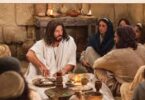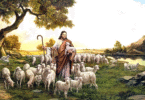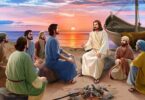4th Sunday of Ordinary Time (Year A)
Scriptures: Zeph. 2:3; 3:12-13; Ps. 146:6-10; 1 Cor. 1:26-31; Matt. 5:1-12
A story is told about a frog who lived in a pond. He shared a friendship with two herons and they enjoyed each other’s company, although the frog often bragged about himself. The herons are known for their sociability and they tolerated his bragging. One day, they all realized that their pond was getting dried up, and the frog got worried about it. The herons came up with a unique plan; they could transfer the frog to another pond. The two herons would carry the stick and the frog had to bite the stick all through the journey. As per the plans, they started flying in the sky. The people started admiring their efforts and unity. The villagers were questioning whose ideas it was. The frog could not hold on to himself. He opened his mouth to say that it was his idea. As he opened his mouth, he lost the grip of the stick, he fell down and died. His boasting cost him death.
All the readings of this Sunday help us to understand this important lesson for our spiritual lives. The first reading is taken from the book of prophet Zephaniah. He is considered as one of the least among the minor prophets of the Old Testament. There is only one mentioned in the Gospels from his book (Mt. 13:41). The comparative studies of the scriptures before and after the second Vatican council shows that there was not even a single reading from the prophet Zephaniah before the second Vatican council. Whereas, hardly 15 to 25% content of his book has been taken in the liturgies after the second Vatican council on Sundays and weekdays respectively. It is so true to his name, which means God hides or the Lord is hidden that this book has remained hidden from the readers.
The prophet lived at the time of the reign of Josiah (640 – 609 BC). He is considered a contemporary to prophet Jeremiah. After the discovery of the book of Deuteronomy, King Josiah began his reform. He wanted to reform the land and bring the people back to God. But he could not undo the sins of his predecessor. The people did not turn away from the idols. Zephaniah had sensed the impending doom. He warned about the day of the Lord on earth especially against Judah and Jerusalem. He invited them to seek righteousness and humility before the Lord. But no one bothered to listen to him. They were busy boasting about themselves, their religiosity, pomp, etc. Eventually, the Babylonian destroyed Judah and Jerusalem in 597 BC. The prophet’s name, his message, his book tells us that we should never boast about ourselves but seek God’s righteousness in our lives.
In the second reading, St. Paul faces an uphill task of division in the Corinthian community. The problem among the Corinthians was their overconfidence. They boasted about their wisdom. They believed that their wisdom would save them. They thought that their initiation in Christ had made them heirs of heavenly wisdom. They considered themselves superior to others. He made them aware that they should not boast about themselves but of Jesus whose saving act is the reason for their salvation. St. Paul saw that their boastful attitude was the root cause of their wrong ideas. He invited them to surrender this sinful habit of boasting.
The Gospel text is taken from the gospel of Mathew. Mathew portrays Jesus as a new Moses in his Gospel. There is great parallelism seen in his gospel between Moses and Jesus. It is believed that Moses wrote the first five books of the Torah. In comparison, Jesus is portrayed giving five long discourses on life in the Gospel of Matthew. Moses received a law on Mt. Zion so Jesus gives the beatitudes from the mount. The ten commandments make the core of Jewish faith, therefore, the beatitudes make the core of Christian living.
There is a major difference in the commandments and the beatitudes. The commandments are very simple. They are explained in dos and don’ts. They could be self-centered. Men in the days of Jesus, were praised for keeping the law meticulously. The scribes, the Pharisees supported such practices. Therefore, they had conflicts with Jesus. Jesus was inviting them to go beyond the commandments. He was inviting them to follow the beatitudes. They were not laws or commandments. These beatitudes sprang from the love of God and love of neighbour. The scribes and Pharisees could not accept Jesus’ teaching. They boasted to inherit the kingdom by simply keeping the law. They boasted about having the law. They believed the law would save them.
Each of the examples in today’s liturgy gives us only one message. Boasting is an ugly sin. It can take our life like that of the frog. It can be done very easily without even realizing that we have already committed it. The sin is committed when we desire to put ourselves and our accomplishment above others. This sin is rooted in pride. St. Thomas says that it is the queen of all vices. Pride withdraws man from the subjection of God. Zephaniah, St. Paul and Jesus had their audiences who were gripped with pride. These people boasted of their religiosity and identity; their wisdom and the law. They thought it would save them but we know the result.
Let us pray that we may not fall into the sin of boasting or bragging but truly understand the beatitudes thus making them part of our lifestyle. May we learn to say like St. Paul; I will boast only in Our Lord Jesus Christ. (1 Cor 1:31)
~ Fr. Alex D’Mello






